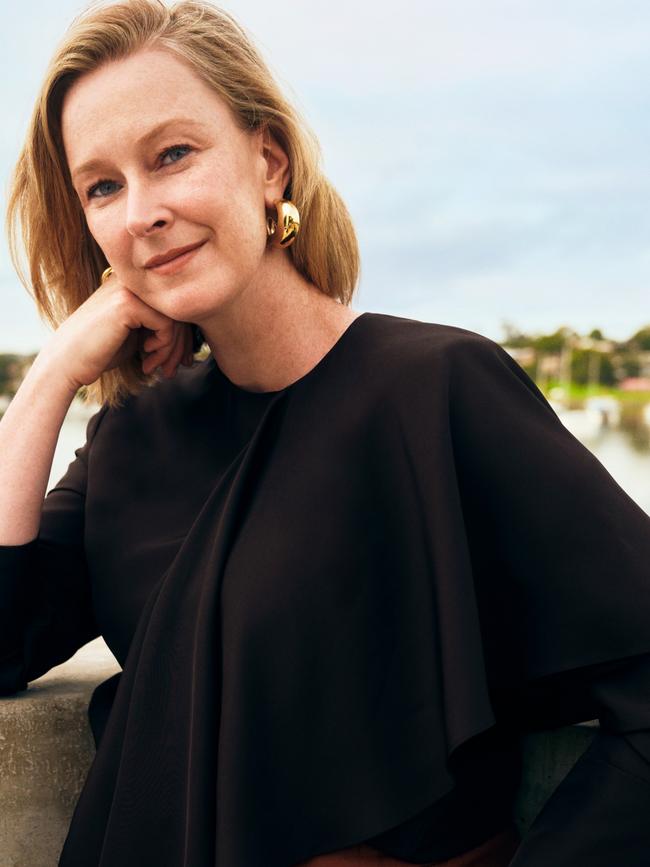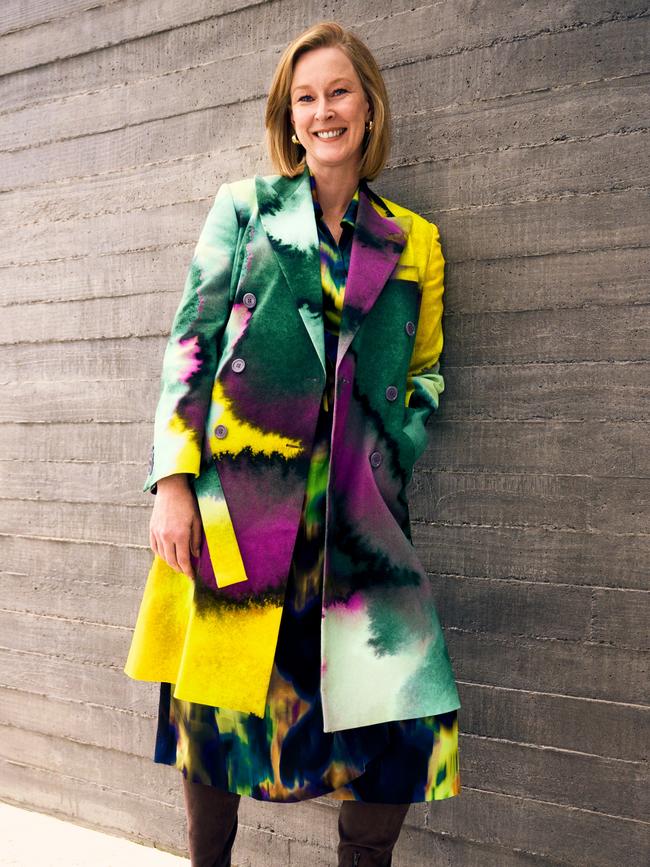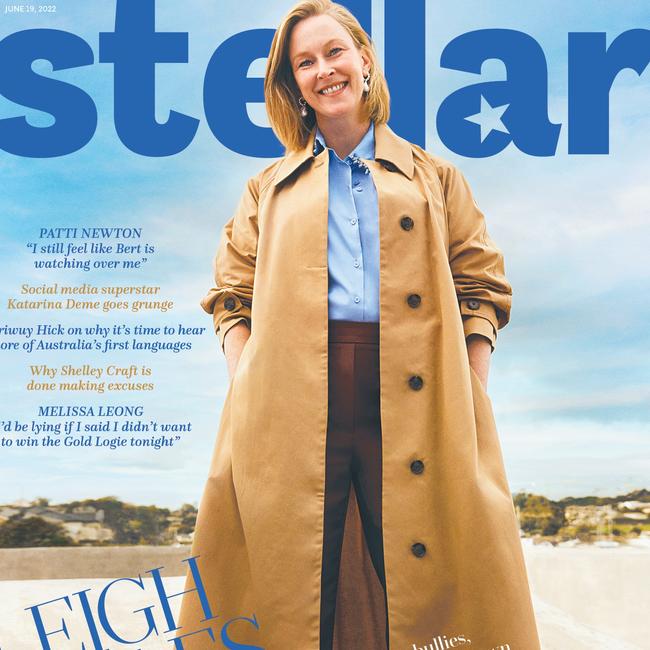Leigh Sales breaks her silence on life after 7.30
In her first interview since announcing her shock departure, 7.30 host Leigh Sales opens up on the social media trolling she’s endured - and reveals what’s next for her career.
Stellar
Don't miss out on the headlines from Stellar. Followed categories will be added to My News.
Across nearly a dozen years at the helm of the ABC’s nightly current affairs program 7.30, presenter Leigh Sales interviewed countless world leaders and public figures – including five prime ministers. It has been a highly scrutinised run that won her praise but also brought with it an astonishing level of vitriol which, she tells Stellar in her first interview since announcing her imminent departure from the show, took “a really hard toll on people close to me”. As she sits down to answer her critics, she also considers another important question: what comes next for Leigh Sales when she signs off at the end of the month, aside from finally getting time to spend more weeknights on the couch with her two young sons?
When you announced on air in February that you had decided to step down as presenter of 7.30, after almost 12 years in the role, you assured viewers, “There’s nothing wrong, other than I just feel a strong sense of it being time to pass the baton to the next runner in the race and to take a break.” But anchoring the ABC’s nightly current affairs flagship program is a hard job to walk away from – and there is something wrong about the trolling and outright bullying you have endured in recent years, isn’t there?
Leigh Sales: Completely – and [also for] so many of my colleagues. The thing that strikes me so much is the reaction of people in real life to me versus the way people behave online – [it’s] just such a sharp contrast.
People really do feel like you’re their trusted friend. Unless you’re particularly kind of rabidly ideological, I think most people like seeing politicians of all stripes held to account, so the feedback I get from people in real life is, “Thanks Leigh, keep sticking it to them.”
So that’s kind of heartening, because it makes you realise that what you see on social media isn’t real life.
To that end, many readers of Stellar – and indeed many viewers of 7.30 – would be unaware of the sheer volume and vitriolic tone of the comments and insults that are directed at you on a daily basis on social media, which typically veers from furious accusations of your supposed political bias to highly personal attacks on your personality and appearance, and even sexualised abuse. You left Twitter earlier this year, but no doubt you’re aware the pile-on continues pretty much whenever you’re on air... How has it felt to be on the receiving end of that?
LS: I just ignore it, to be honest. I was using Twitter less and less; people have reported that I left because there was an interview with Scott Morrison and then I was abused, but I was abused all the time, so actually that had nothing to do with it.
I just decided to jump off before the election because I thought the level of the trolling would ramp right up. But you’re quite right, whether you’re on it or not, there’s a rabid group of bullies who just use any excuse to pretty much pile on.
So I just ignore it. The problem is, this kind of online ripping up of people can translate into real-life violence. I have two protective violence orders on me from random people who’ve made threats against me.
There have been others where police have looked at them and recommended certain courses of action. I don’t know for sure that that’s related to that online mentality, but I think it certainly wouldn’t help, particularly the level of misinformation that’s out there; this constant narrative that I’m attempting to back in one side of politics or the other, which is completely false.
Some people who are kind of vulnerable can read that and believe it to be true; so I think there’s a risk that it motivates people into real life.
![Leigh Sales: “Whether those questions [to politicians] are popular or not, they still have to be asked.” Picture: Duncan Killick.](https://content.api.news/v3/images/bin/ddd51777dc64fedf63fe74df5b72a1ec?width=650)
Last year you appeared at a press conference held by Victorian Premier Daniel Andrews and earned the ire of the online mob by daring to ask him a question... We had all manner of people asking: can you please ask why we have to lock down?
LS: I would get notes from people whose kids were at home having mental health issues because they’d been out of school, small business people begging me to keep asking questions like that.
That’s who I think I’m there doing my job for: people at home who don’t have power, who want questions asked of people in power.
Now whether those questions are popular or not, they still have to be asked. So there could be absolutely valid reasons why you would lock down an entire state for half-a-dozen well-traced cases.
There could be an excellent answer to that question, but the question still should be asked.
There will be some people who think journalists being trolled is part of the job – and as you’ve noted in the past, this isn’t a profession for the thin-skinned – but the wider problem here is how can our elected representatives be held to account if they’re only asked questions that their fans deem kind enough and their detractors deem brutal enough?
I couldn’t agree more. Whether it’s politicians, bank CEOs, insurance company CEOs, people who run nursing homes – people who are given a lot of responsibility and power and can influence the lives of the rest of us in potentially ruinous ways – they should be held to the highest standards of accountability.
And if we’re getting into a place where we think that, well you shouldn’t ask those questions because he’s our guy, that’s a massive problem.
How do your friends and family respond to the abuse you’ve experienced?
LS: I think it takes a really hard toll on people close to me, because I think they feel like they can’t protect me from it. Because they know me as a person, they feel that it’s unfair and I don’t deserve it.
My ex-husband, Phil [Willis, who Sales was married to for 20 years], sometimes – this was pre social media being so crazy – he might read someone’s column in the newspaper and he would be so angry about it and say “It’s so unfair. That’s just not even true.”
And I’d kind of laugh it off. He would be far more upset about it than I would be, so I think that is hard for people around me.

One of the persistent social-media tropes has been the casting of Laura Tingle (the chief political correspondent on 7.30) as the hero to your villain. As colleagues, how have the two of you navigated that?
LS: Do you know what? We’ve never actually talked about that.
Me and Laura get on great, we’ve got a lovely, kind of bantery relationship. I love working with Laura. She’s one of the people who I’ll really miss.
So from my perspective, what some numskull says on Twitter has no impact whatsoever on my great affection for Laura.
Beyond social media, what are your interactions like with people in real life?
LS: Oh, so, so lovely. People have just been so kind to me. It’s just overwhelming, to be honest.
One time a waiter at a cafe came up to me and handed me a note; the person hadn’t wanted to interrupt me and had written about how much their daughter looked up to me.
The letters and cards that people send all the time... and just even in the neighbourhood, when I quit I would walk into the local cafe and it would be like, “Oh, my God, what are you going to do?” It’s that kind of friendly level of investment. It’s really, really nice.
If people meet you at a dinner party, are they scared at the thought of getting into a debate with you?
LS: I think within 30 seconds of meeting me they realise I’m not an intimidating, argumentative type of person, like I might appear to someone watching a political interview.
The only time people tend to feel a bit overwhelmed, I think, is if they’re big fans. Like sometimes people will say things like, “Oh my God, I love you.”
So I’ll say something like “Well, I love you, too, but I think we should see other people” [laughs], just to try to diffuse it.
So, to steal my next question from the people in your local cafe: what are you going to do next?
LS: This is the first time I’ve ever quit a job and not had the next thing locked down, which is both kind of scary but also really exciting.
I feel like I need to make a list of things I like about my job and journalism, and [a list of] things I don’t like. And once I’ve got that list, what’s a job I could do that would meet the things I like?
I don’t like doing live, rolling, unscripted television. Well, that means I’m never going to host a breakfast television show – that rules me out forever for that.
I’ve got six months of long-service leave, so I’ll take that. I need a break to have some time to figure it out but I love working at the ABC and I know that whatever I do next here, it will be interesting and meaningful.
You have two sons, aged 10 and eight. What will family life look like after you finish up?
LS: I don’t know because I’ve been someone who hasn’t had their dinner at home most nights of the week for 15 years.
So I know it sounds weird but what does that look like? Will I cook dinner and then we’ll eat it at six o’clock? I don’t know.
The kids love sitting on the couch, cuddling and watching TV and arguing over what we’re going to watch tonight and stuff like that. And that to me seems like heaven to do that every night.

How did your boys react when you told them you were leaving?
LS: Oh, my God. They were ecstatic.
Their dad let them watch the night when I announced that I was leaving. And the little one, James, said he was a little bit happy and a little bit sad, because he could see that I was teary. So he was a little bit emotional.
But then Phil asks Daniel, the oldest one, how he was and he said, “I’m just 100% happy.”
So they’re thrilled. They don’t really care what I do, they just want me around more.
Let’s say in a few years from now, Ita Buttrose decided to retire and you were asked to be the new ABC chair. This is the eternal question all parents have to grapple with, but let’s be honest, it’s still mainly mums who seem to struggle with guilt: how would you navigate that?
LS: There’s always opportunity cost, right? Every single thing you say yes to means you have to say no to other things. But, you know, I hear all the time this conversation about women and the lack of women in senior roles.
And honestly, from my own experience and those of my friends in the same age group, the biggest barrier to women in the workplace isn’t opportunities at work, it’s balancing it with home life.
Most women I know don’t want to take on additional responsibility because we feel like we’re basically drowning with our existing level.
I’ve had all the support in the world in the workplace, and my ex-husband is fantastic at helping with the kids, but it’s still just a very hard slog having two kids and a big job, even when you’ve got great help.
I’ve had a wonderful nanny for nearly the entire time, and my friends are absolutely brilliant at helping as required, but there are certain things that only a mother can do. And there are certain things that you want to do but you don’t want other people to do. So that, I think, is a great challenge.
If we want more women to have more senior roles in workplaces, then we have to get more dads to take up more slack at home.

You and your ex-husband separated six years ago. We’ve come a long way as a society in how we approach co-parenting and divorce – has that been the case for you?
LS: Full credit to Phil, it’s not that easy being married to or the ex-husband of a journalist because of the nature of changes in your life all the time.
I can’t tell you how many times I’ve had to call Phil and say [something like] “Gladys Berejiklian has just resigned. I’ve got to go into the office. I know it’s my night with the kids, [but] I have to host a special show. How soon can you be here?”
He just has to drop his entire life and go, “OK, I can be there in 40 minutes.”
That’s been great for me but also for our kids because they see that Mum and Dad respect each other, and our vibe is that we’re still a family even though Mum and Dad don’t live together.
The message is always we’re family, we’re a team. So we try really hard to model that behaviour. Of course if it were perfect, we wouldn’t be divorced [laughs]. So we try to keep arguments and disagreements quiet and not affect our children with that.
As far as our kids are concerned, it’s all a very united team.




